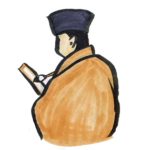Hayatochiri (早とちり – Jumping to Conclusions)
Hayatochiri
早とちり
Yesterday, I did an act called hayatochiri (早とちり) in Japanese.
昨日私は「早とちり」と呼ばれる行動をしました。
Hayatochiri means to make a mistake or fail due to one’s hasty judgment.
早とちりとは、早合点をして間違えることや、失敗することを意味します。
Haya (早) means “early/quick,” and tochiri (とちり) is a noun form of the verb tochiru (とちる), which means that an actor blows/fluffs their lines or makes a mistake in acting.
「早」は “early,” 「とちり」は役者がセリフや演技を間違えることや、失敗することを意味する動詞「とちる」の名詞形です。
The verb tochiru (とちる) came from tochimenbou (栃麺棒) — here tochi (栃) means “Japanese horse chestnut,” men (麺) means “noodle,” and bou (棒) means “stick/rolling pin.”
「とちる」は、栃の実の粉を原料にした橡麺を作るための棒、「栃麺棒」に由来します。
Since people had to use rolling pins hastily in order not to stiffen the noodles, it came to mean to make a mistake or fail.
橡麺を作るとき、麺が固くならないようにせわしなく栃麺棒を扱ったことから、「間違える」や「失敗する」のような意味を持つようになったそうです。




